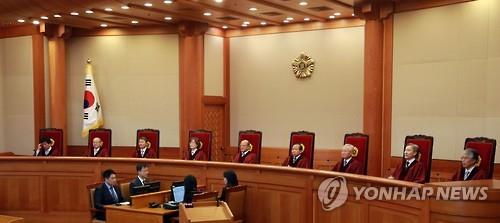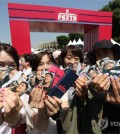- California Assembly OKs highest minimum wage in nation
- S. Korea unveils first graphic cigarette warnings
- US joins with South Korea, Japan in bid to deter North Korea
- LPGA golfer Chun In-gee finally back in action
- S. Korea won’t be top seed in final World Cup qualification round
- US men’s soccer misses 2nd straight Olympics
- US back on track in qualifying with 4-0 win over Guatemala
- High-intensity workout injuries spawn cottage industry
- CDC expands range of Zika mosquitoes into parts of Northeast
- Who knew? ‘The Walking Dead’ is helping families connect
Court upholds controversial anti-graft law as constitutional
SEOUL, July 28 (Yonhap) — The Constitutional Court upheld a controversial anti-graft law, which subjects journalists and private school teachers along with public officials to strict guidelines in regards to gifts, paving the way for its official implementation.
The so-called Kim Young-ran Law, named after its proposer, prohibits civil servants, journalists and those hired by private schools from receiving goods and services that exceed 1 million won (US$888) or 3 million won in total annually. The rules make it illegal to accept meals exceeding 30,000 won, presents in excess of 50,000 won and congratulatory or condolence money totaling over 100,000 won. The law is slated to take effect on Sept. 28.
Local journalists and their associations, as well as private school organizations, filed four separate petitions, asking the court to review the law shortly after it passed the National Assembly in March last year.
They said the new law, which was created to ensure the fair performance of duties by public officials, infringes upon freedom of the press and private schools by including journalists and private teachers in rules meant for public officials.
The court, however, said the law does not put direct restrictions on contact between journalists and their sources, or on their legal rights to report and to inform the public. The petition filed by private school teachers was dismissed for similar reasons.
“Educators and the press have a huge impact on the country, and corruption among workers in these fields exerts long-lasting effects,” the court said, explaining the legitimate need to regulate these sectors under the law.
Previously, it was difficult to punish public officials, journalists and teachers under bribery charges if a connection with their duties could not be proven. Under the new law, they can be punished regardless of whether the money or gifts were given in relation to their job or not.
Regarding a clause that mandates public officials, journalists and teachers to report if their spouses receive any prohibited goods or money, the court said such a step is necessary to uphold the aim of the law.
The justices also rejected petitioners’ claims that the law failed to specify what conduct is punishable or not.
The expression “illicit request (in return for money)” has been used in diverse legal clauses and the nation’s top court has accumulated enough precedents on how it should be defined, it said.
The court, meanwhile, rejected to rule on one of the petitions filed by the Journalists Association of Korea, saying the organization cannot claim its rights will be affected by the law.
South Korea’s Anti-Corruption & Civil Rights Commission said it respects the decision made by the top court, adding the organization will make efforts to implement the law on time in September.
“We hope the anti-graft law will help root out corruption in society and improve the transparency of the country,” the commission said.
The commission added it will come up with manuals as well as education programs to improve public awareness of the changes.
Political parties also expressed support for the ruling on the anti-graft law.
“We will support the idea of the law that aims to build a society without irregularities and corruption,” the ruling Saenuri Party said in a statement, adding it will also make efforts to minimize potential side-effects.
The main opposition Minjoo Party of Korea also vowed to root out corruption in the country through strict implementation of the law, adding it also advocates making the country more transparent.
Saenuri, meanwhile, is considering a revision to the law to exclude agricultural and fishery goods from being counted as gifts, amid worried voiced by farmers and fishermen that strict application of rules could have an adverse impact on local industries.
The minor opposition People’s Party echoed this view, adding that the government should carry out a review to correctly estimate potential damages on the livelihood of the workers in certain sectors and come up with viable countermeasures to limit fallout.

Park Han-cheol (C, rear), chief justice of the Constitutional Court, and the court’s justices are seated at the court in Seoul on July 28, 2016. The court upheld the controversial anti-graft law, which subjects journalists and private school teachers along with public officials to strict guidelines in regards to gifts, paving the way for its official implementation.












